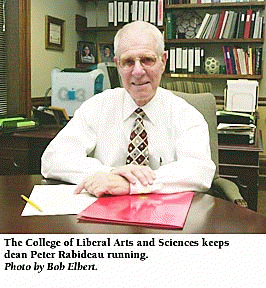Inside Iowa State
September 22, 2000
Marathon man has a lot on his mind
 by Steve Sullivan
by Steve Sullivan
To run the university's biggest
college -- the college that touches the lives of every
student at Iowa State -- it helps to run.
At least, it helps Peter Rabideau, now in month 14 of his tenure as dean of the College of Liberal Arts and Sciences. A veteran of several marathons, including the famous one in Boston, Rabideau manages to put away his administrative duties long enough to get in several miles of roadwork each day.
"It's absolutely necessary that I get away from my desk and run almost daily," said Rabideau, who also holds a black belt in karate. "It has great benefits psychologically. When I run, I'm more creative and I come up with solutions to things. I do a lot of thinking when I run."
Given what he's been thinking about lately -- the identity of LAS, performance arts education, temporary faculty, to name a few -- Rabideau has been logging a lot of miles.
College identity
When Rabideau arrived in July 1999, he said LAS may
have lacked a bit of collective self-esteem. This is no
surprise given the size of the college and the diversity of
its departments. It is easy for Business, Engineering or
Design students to identify with their colleges. LAS
students, however, are more likely to identify with
departments, such as English or chemistry.
Rabideau has attempted to address the identity issue by creating a communications position and Around LAS, a regular newsletter featuring the latest activities and accomplishments of the college's faculty, staff and students. An annual report for alumni, friends of the college and opinion leaders is due soon.
"The college hasn't done a good job of promoting itself internally or externally," Rabideau said. "We hadn't even been keeping our own faculty and students informed about the college."
Rabideau also has taken on an increasingly contentious issue of what the university does for its temporary appointments. The issue grew, in large part, out of concerns temporary faculty in English had about their lot on campus.
"ISU has a rather unfriendly environment for its non-tenure track people," Rabideau said. "There are people who would be happy with a non-tenure track arrangement, like to teach and do a good job. They don't have the opportunity here because we terminate after five years. We need to create a reasonable environment for these people so they can have the opportunity for continuous employment and advancement."
Temporary faculty are a fact of life at large universities, where budgetary limitations prohibit all classes from being taught by tenure-track faculty, Rabideau said. He is on a university committee studying the issue and will make a recommendation to the Faculty Senate soon, he said.
Rabideau faced a similar issue at Louisiana State University and is familiar with the concerns the issue raises among tenure-track faculty.
"I came to ISU because it was a member of the Association of American Universities and a Carnegie Research I University. The last thing I want is to replace tenure-track faculty with non-tenure track just to save money," he said.
Prior to ISU, Rabideau had been dean of the College of Basic Sciences at LSU since 1990. While there, he initiated a center for excellence in science teaching. He also spent 20 years on the chemistry faculty at Indiana University-Purdue University at Indianapolis.
He served for two years (1997-98) on a National Science Foundation panel that studied integrating graduate education and research training.
His current research is the synthesis and chemistry of bowl-shaped hydrocarbons, "buckybowls." While his first year as LAS dean slowed his research activity, Rabideau and his buckybowl team have stoked it up and have several publications on the way. A journal reviewer has dubbed one "a potential landmark publication," Rabideau said.
Science and art
All this is by way of saying that Rabideau brings an
intensely scientific background to ISU's biggest college.
But, lately it's the performing arts that have been making
the news in LAS.
"The arts and humanities helped attract me to this job," Rabideau said. "I was a science dean -- I know that, I've done that, I understand that. Looking for opportunities in the arts, in non-science areas, is something new. It was a challenge that I wanted to take on."
The music department recently hired international opera star and Iowa native Simon Estes as a professor for 10 weeks each year.
Rabideau has big plans for performing arts education and Estes may be the first step. LAS already is home to ISU's first school -- the Greenlee School of Journalism and Communication -- and Rabideau has his eye on a second. He wants to create a $10 million endowment for a school of music and theater.
"Music and theater are in a single department, and I'm not sure I'm satisfied with that arrangement," he said. "A school would elevate both programs. I'm hoping Simon Estes will be able to help us interest donors in helping us create a school of music and theater."
Science isn't taking a back seat in Rabideau's thoughts. He's also concerned about improving information technology education and creating an institute for science, technology and society that would bring together the college strengths in economics, philosophy, political science, history, journalism and other areas to better communicate science to the masses.
With all these issues and goals, Rabideau clearly has a lot of miles ahead of him.
Iowa State homepage
Inside Iowa State, inside@iastate.edu,
University Relations Revis
ed 9/20/00
Copyright © 1999-2000, Iowa State University, all rights
reserved
URL:
http://www.inside.iastate.edu/2000/0922/rabideau.html